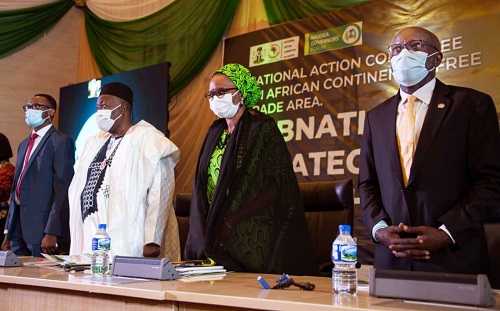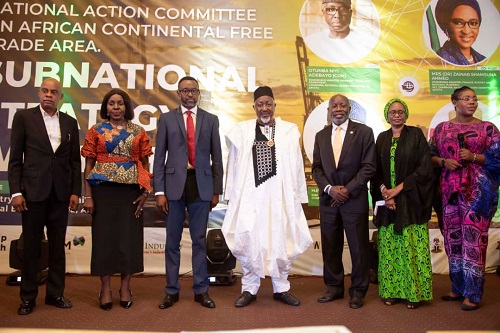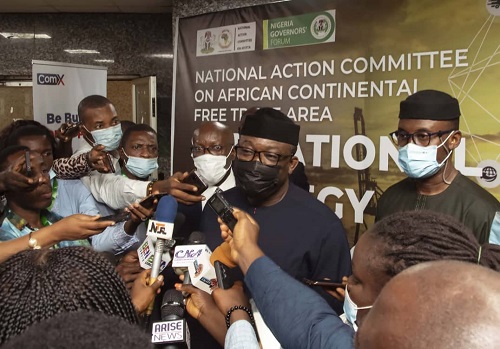A nation can only advance in as much as there is forward motion and progress amongst its people. For progress to take place, changes must be implemented from different sectors such as education, the economy, enterprise, innovation, and trade.
Along the lines of trade, on Tuesday, November 23rd, the National Action Committee on African Continental Free Trade Area (AFCFTA) and Nigeria Governors’ Forum (NGF) held a 3- Day Subnational Strategy Workshop at the Ministry of Finance in the Central Business Area to discuss trade solutions to drive Nigeria forward.

There were dignitaries in attendance which included His Excellency, Dr. Kayode Fayemi, the Chairman of the NGF, Mr. Asishana B. Okauru, the Director-General of the NGF, H.E. Muhammad Badaru Abubakar, the Executive Governor of Jigawa State, and many others.

“The objective of this workshop is to distill significant opportunities for Nigeria that drive job creation and capacity building within the states with the creation of a single liberalized market for trading services for the continent,” said the Chairman.
The Chairman of the NGF, Dr. Fayemi stated that the AFCFTA both enables the trading in products and services as well as human capital to thrive with the elimination of red tape through the reduction of tariff and non-tariff barriers and through the simplification of customs procedures.
He added that AfCFTA has created significant opportunities for Nigeria to drive job creation and capacity building. With the creation of a single liberalized market for trade in services for the continent, the AfCFTA enables both the trade-in products and services as well as human capital.
“Also, within the country, states can improve their capacity through the exploitation of State factor endowments and knowledge and skill transfers. Inter-state competitiveness can stimulate job creation in various multi-sectors through investment and implementation of development plans.
The result is, therefore, beneficial, with the agreement serving as a foundation for continental, national and subnational human capital development,” said the Chairman.
The Director-General of the NGF added that the Africa Continental Free Trade Agreement is the latest continental initiative to foster economic development in the continent.
In addition, he stated that the awareness of states on this in Nigeria is very low.
“That is the whole purpose of this meeting today. If this agreement is to succeed in Nigeria, it is important that we domesticate this at the state level and that is exactly what we are doing now,” said Mr. Okauru.
Furthermore, Mr. Okauru said the successful implementation of this agreement in Nigeria is dependent on supporting the sub-nationals to organize themselves into functional units.
The Governor of Jigawa State said he believes that Nigeria can succeed in the trade.
“We need to invest more in local production and do what is necessary to penetrate the Africa Market,” said Mr. Abubakar.
Mr. Abubakar placed emphasis on his state’s growth. That the GDP has doubled in the last six years by targeting investments in Nigeria.
His Excellency said that the role of the sub nations is to do more targeting. That the states must promote this around and seek solutions.
“There must be opportunities where you can create jobs for our people. We will do this by strengthening regulations, improving the ease of doing business, harmonizing policies, upscaling acquisition for micro-enterprises, and preventing distortions and discrimination.”
The Governor said that at the State Level, they will do their best to enlighten people.
The Jigawa State Governor elaborated that there are several benefits this agreement presents to the Federal and State governments. These include:
1. At the Federal level, Nigeria is already utilizing regional trade opportunities, contributing approximately 76% of total trading volumes in the Economic Community of West African States (ECOWAS) region. We strongly believe this number can improve when sub-nationals participate actively in regional trade.
2. The increase of direct investment and creation of new business opportunities for multiple sectors within each sub-national’s economy (including the distribution and logistics supply chain, as well as transportation infrastructure) by putting in place progressive policies and simplified customs procedures, making sub-national and intra-Africa trade more enticing for domestic producers.
3. One of the primary benefits initiated by the agreement is access to regional supply chains. Member countries and their sub nationals can access new opportunities regarding intra-regional exports and can leverage domestic markets by creating supply chains that are both efficient and sustainable.
As part of the strategy workshop, Mr. Eghosa M. Omoigui, the Head of Stakeholder Relationship discussed subnational competitiveness. He said that achieving competitiveness is at the heart of the AFCFTA strategic objective. That Nigeria is becoming a less productive country. He stated that Nigeria’s productivity in the economic index is declining from 102nd to 144th position. Mr. Eghosa added that competitiveness is all about collaboration.
‘If you wait for the season to be ripe, you won’t show anything,” he said. To ensure Nigeria maximizes AFCFTA potentials, Mr. Eghosa said we must rethink our subnational collaborations as a strategy for improving regional development.
Mr. Eghosa also placed emphasis on NGF’s partnership with the National Economic Summit Group (NESG) which provides research and policy support for states.
There are many programs in the works such as the Ready to Invest Programme, the What Works Hub, the Subnational Data and Information System, the NES Subnational Recommendations Implementation Coordination.
“We can be competitive through collaboration. We have the market, and we have to refine to be competitive,” he said. The workshop also included presentations from Mrs. Chinyere Almona, the Director-General of the Lagos Chamber of Commerce and Industry (LCCI).
Mrs. Chinyere stated that market access through language is key in this discussion.
“If enough people speak the same language, they will be able to communicate more easily,” she said.
She said that government has the capacity to change the population’s linguistic skills by implementing language policies that introduce a different language in the educational system.
Mrs. Chinyere also elaborated on market intelligence as a key challenge for exporters when it comes to the scarcity of reliable trade information on markets.
She said that international trade has a significant presence of risks and uncertainties, and market intelligence helps.
For countries and companies that want to establish trade partners to produce and sell their products in foreign countries, she said that what NGF and AFCFTA should do is to:
• Identify natural resources in your territories
• Explore the possibility of establishing special economic zones
• Develop an AFCTFTA strategy for the state
• Build Integrated Road and rail networks
The workshop concluded on Thursday, the 25th of November but the discussions continue on and plans for trade will take shape as NGF will coordinate with states to follow through on their process to enhance trade in Nigeria.



